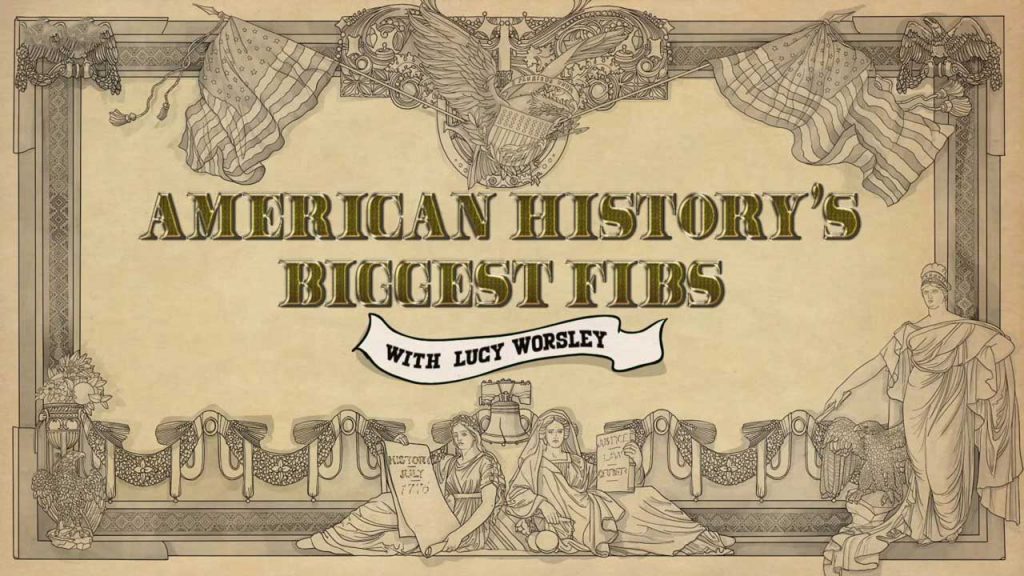American History’s Biggest Fibs episode 1: In the first of a three-part series, Lucy Worsley explores how American history has been mythologised and manipulated by generations of politicians, writers and protesters. This episode examines the American Revolution – a David-and-Goliath battle of men with high ideals taking on the might of the British Empire. But how much of America’s founding story is based on fact?
Lucy Worsley reveals the myths and manipulations behind American history. Lucy Worsley is a British historian, author, curator, and television presenter. She is Joint Chief Curator at Historic Royal Palaces but is best known as a presenter of BBC Television series on historical topics.
American History’s Biggest Fibs episode 1
Lucy Worsley
Lucy Worsley began her career as an historic house curator at Milton Manor, near Abingdon, in the summer of 1995. before working for the Society for the Protection of Ancient Buildings. From 1996 to 2002, she was an Inspector of Historic Buildings for English Heritage in the East Midlands region. During that time she studied the life of William Cavendish, 1st Duke of Newcastle and wrote the English Heritage guide to his home, Bolsover Castle. In 2001, she was awarded a DPhil degree from the University of Sussex for a thesis on The Architectural Patronage of William Cavendish, first Duke of Newcastle, 1593–1676. The thesis was later developed into Worsley’s book Cavalier: A Tale of Chivalry, Passion and Great Houses.
During 2002–2003, she was Major Projects and Research Manager for Glasgow Museums before becoming Chief Curator at Historic Royal Palaces, the independent charity responsible for maintaining the Tower of London, Hampton Court Palace, Kensington Palace State Apartments, the Banqueting House in Whitehall and Kew Palace in Kew Gardens. She oversaw the £12 million refurbishment of the Kensington Palace state apartments and gardens completed in 2012. In 2005, she was elected a senior research fellow at the Institute of Historical Research, University of London; she was also appointed visiting professor at Kingston University.
American Revolution – American History’s Biggest Fibs
The American Revolution was an ideological and political revolution that occurred in British America between 1765 and 1791. The Americans in the Thirteen Colonies formed independent states that defeated the British in the American Revolutionary War (1775–1783), gaining independence from the British Crown, establishing the constitution that created the United States of America, the first modern constitutional liberal democracy.
American colonists objected to being taxed by the British Parliament, a body in which they had no direct representation. Before the 1760s, Britain’s American colonies had enjoyed a high level of autonomy in their internal affairs, which were locally governed by colonial legislatures. During the 1760s, however, the British Parliament passed a number of acts that were intended to bring the American colonies under more direct rule from the British metropole and increasingly intertwine the economies of the colonies with those of Britain. The passage of the Stamp Act of 1765 imposed internal taxes on official documents, newspapers and most things printed in the colonies, which led to colonial protest and the meeting of representatives from several colonies at the Stamp Act Congress. Tensions relaxed with the British repeal of the Stamp Act, but flared again with the passage of the Townshend Acts in 1767.
The British government deployed troops to Boston in 1768 to quell unrest, leading to the Boston Massacre in 1770. The British government repealed most of the Townshend duties in 1770, but retained the tax on tea in order to symbolically assert Parliament’s right to tax the colonies. The burning of the Gaspee in Rhode Island in 1772, the passage of the Tea Act of 1773 and the resulting Boston Tea Party in December 1773 led to a new escalation in tensions. The British responded by closing Boston Harbor and enacting a series of punitive laws which effectively rescinded Massachusetts Bay Colony’s privileges of self-government. The other colonies rallied behind Massachusetts, and twelve of the thirteen colonies sent delegates in late 1774 to form a Continental Congress for the coordination of their resistance to Britain. Opponents of Britain were known as “Patriots” or “Whigs”, while colonists who retained their allegiance to the Crown were known as “Loyalists” or “Tories.”





Ughhhh, Lucy Worsley does her usual pick and choose telling of history. America needs a Brit to come over and tell us our history-YAwN. There was not a single thing, as an American, I did not know though my education in America that Lucy parades out as shocking. Lucy makes it sound like Americans don’t know Washington was a slave owner. They didn’t know the French were key in the American Revolutionary War. She portrays Americans as believing FICTION writers and poets as documentarians telling the truth in history. Here’s a tip Lucy: we do not ALL think FICTION, or a musical, or a poem are true American history. I think Lucy is just wishing Americans were as gullible as she thinks the Brits are in believing her cock and bull views of some of British history. Go back to London and dust off those historic Royal Palaces, Lucy. We don’t need you in America telling us what we already know and filling the Brits heads with even more BS.